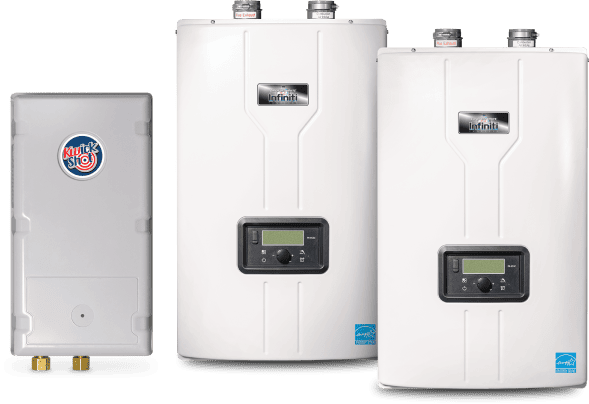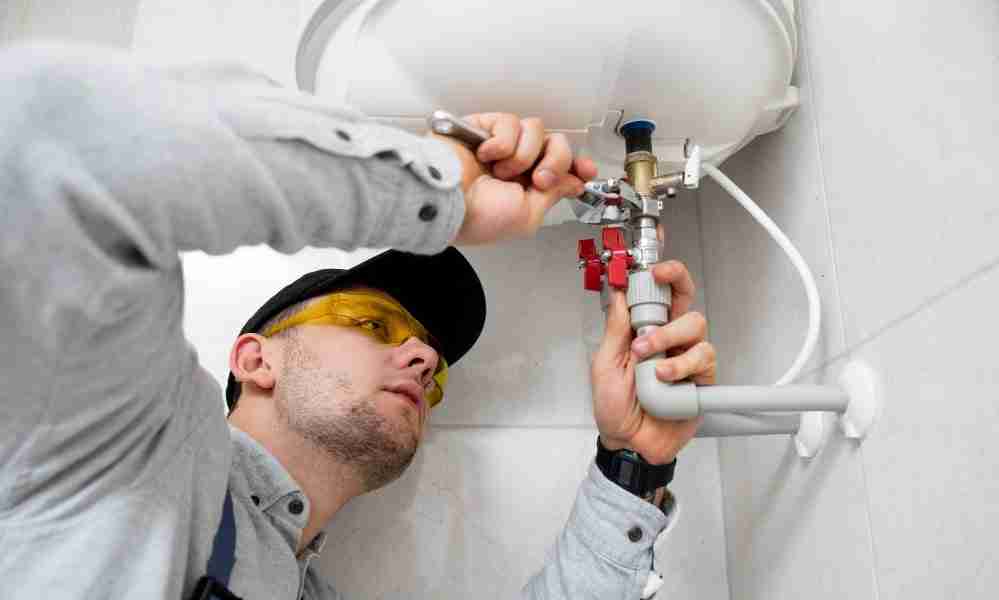Discovering The Advantages Of Instant Water Heaters
Discovering The Advantages Of Instant Water Heaters
Blog Article
The author is making a number of good points relating to Unveiling the Hot Trend: The Benefits of Tankless Water in general in the article just below.

In a globe where ease and effectiveness reign supreme, it's no surprise that house owners are constantly in search of smarter ways to manage their home's power usage and convenience. One development that has actually gradually gained popularity is the tankless water heater. But just what makes these systems stick out from the conventional tank-based models most of us grew up with? Allow's dive in and discover the advantages of tankless water heaters, assisting you determine if it's time to make the button in your house.
Introduction
Photo this: you step into the shower after a lengthy day, expecting a comforting waterfall of hot water, only to be welcomed by icy droplets due to the fact that the last person used all of it up. Sound familiar? Standard water heaters save a set amount of warm water, suggesting you're at the mercy of that tank's supply. Tankless systems, on the other hand, heat water on demand. Say goodbye to going out mid-shower, say goodbye to fumbling with timetables simply to ensure hot water is available.
Understanding Tankless Water Heaters
What Are Tankless Water Heaters?
Tankless water heaters, occasionally called on-demand or instantaneous water heaters, offer warm water just as it's needed. Rather than storing gallons of pre-heated water, these devices kick right into action the minute you turn on the faucet. Water travels through a heat exchanger, heating up in real-time, meaning you obtain a nonstop flow of warm water without the need for a large storage tank sitting lazily by.
Exactly how Do They Differ from Standard Solutions?
Typical heating units hold a tank of hot water, making use of power to maintain that tank at a consistent temperature level. Tankless systems eliminate the standing supply, minimizing squandered energy and the bulky footprint of a large cylinder. Essentially, you're upgrading from a "stockpile" frame of mind to a "made-to-order" strategy.
Typical Types of Tankless Units
Tankless hot water heater typically come in two ranges: gas and electric. Gas versions have a tendency to deliver higher flow prices, suitable for larger families, while electrical models often offer smaller sized homes and are normally less complicated to set up. Additionally, some systems are made for point-of-use (serving one component) while others can deal with the whole home's warm water needs.
Secret Benefits of Tankless Water Heaters
1. Endless Warm Water Supply
Ever before had to set up showers so everyone gets their reasonable share of warm water? With tankless, that ends up being a distant memory. As long as the heater's circulation ability isn't exceeded, you can take back-to-back showers without developing into a popsicle.
2. Energy Effectiveness and Expense Savings
No more warming a giant tank's well worth of water and maintaining it toasty all day. Tankless heating systems decrease standby power losses, which can decrease utility expenses. While the first cost may be greater, the long-term cost savings frequently justify the financial investment.
3. Space-Saving Design
If your home is short on storage space, getting rid of the cumbersome container liberates valuable room. Tankless systems are portable and can typically be placed on wall surfaces, tucked away in corners, or installed in tight energy storage rooms without grabbing all of the whole space.
4. Longer Life-span
A properly maintained tankless water heater can outlive its tank-based relative. Conventional storage tanks could last 10-15 years, while tankless models can keep downing along for two decades or more, making them a strong financial investment over time.
5. Improved Water High Quality
Keeping water in a storage tank can often result in debris build-up or a somewhat "off" taste. With tankless systems, fresh water is heated right away, reducing the chances of debris buildup and potentially providing cleaner-tasting water.
Considerations Before Changing
Though the benefits are engaging, it's wise to think about a couple of aspects prior to completely devoting.
First Financial Investment Prices
Tankless heaters usually come with a higher upfront price. In between the device itself and possible installation adjustments, the initial cost could give you sticker label shock. Yet bear in mind to view it as a long-term investment.
Installation Needs
Relying on your home's framework, you may need additional electric capacity or gas line upgrades. Guarantee you understand the setup needs and talk to an expert to stay clear of shocks.
Evaluating Your Home's Water Usage Patterns
If your home all at once uses multiple fixtures with high hot water demand, make sure the unit's flow rate meets your demands. Recognizing your use patterns assists you select the ideal size and type of tankless heater.
Upkeep and Care Tips
Tankless systems are fairly reduced maintenance, however they aren't set-it-and-forget-it appliances.
Routine Cleaning and Descaling
Tough water minerals can build up in the heat exchanger, affecting performance. Normal descaling (typically advised every year) maintains the unit going for peak performance.
Annual Specialist Assessments
A yearly checkup from a professional makes certain minor problems are captured early. They'll evaluate the system's efficiency, search for leakages, and aid maintain ideal performance.
Making Sure Correct Ventilation
For gas models, appropriate ventilation is important to safely get rid of exhaust gases. See to it airing vent systems are tidy and correctly set up to stop any kind of possible security threats.
Comparing Different Brands and Designs
Not all tankless hot water heater are developed equivalent.
Looking Into Trusted Producers
Look for credible brand names with a history of producing high quality units. A trustworthy supplier usually supplies better client support and longer warranties.
Reviewing Evaluations and User Comments
User testimonials and responses from neighbors or buddies that have gone tankless can supply important understandings. In some cases, real-life experiences can be extra informing than advertising brochures.
Installment: Do It Yourself or Professional?
While some home owners enjoy taking on jobs themselves, tankless installation could not be the very best time to burst out the toolbox.
Pros and Cons of Do It Yourself Installment
A do it yourself install could save money, however it features risks. Wrong installment can lead to ineffectiveness or security concerns. If you're handy and have experience, it could be practical-- but wage caution.
When to Call a Professional Plumbing
For most, calling a professional makes sure whatever's done appropriately. An expert plumbing technician recognizes local codes, sizing needs, and airing vent criteria, reducing the threat of problems.
Optimizing Effectiveness
You have actually invested in a tankless unit-- now maximize its effectiveness.
Ideal Temperature Setups
Most individuals establish their devices in between 120-140 F. Readjusting the temperature can boost convenience and cost savings. Experiment to find a wonderful place that does not squander power.
Pairing with Low-Flow Fixtures
Want to stretch your unit's capacities? Consider mounting low-flow showerheads and taps. They minimize water usage, allowing your tankless system to supply a constant stream of warm water without stressing.
Ecological Influence
Tankless water heaters straighten with greener living objectives.
Minimized Carbon Impact
By utilizing less power and just heating water as required, tankless systems can decrease your home's carbon footprint, decreasing your environmental effect.
Conserving Natural Resources
Much less energy intake and much less wasted warm water convert into less natural resources being used, an environmental win-win.
That Benefits A Lot Of from Tankless Heaters?
The appeal of tankless heaters is that they can suit a selection of households.
Big Family Members vs. Solitary Residents
Big families may like the countless warm water supply, while solitary occupants value the power financial savings from not heating a whole container for just one person's early morning shower.
Home Owners with Restricted Space
If your home is short on square video, losing the bulky storage tank frees up room for various other essentials-- or perhaps just more elbow room.
Eco-Conscious Customers
Going tankless aligns with environmentally friendly values, guaranteeing you're not squandering power or sources.
Future Trends in Tankless Hot Water Heater
The world of home appliances is ever-evolving, and tankless water heaters are no exemption.
Smart Home Combination
Picture readjusting your water heater's temperature through an application or getting maintenance informs on your phone. As wise home technology advancements, we'll see more connection and comfort.
Developments in Modern technology
R&D is regularly enhancing warmth exchangers, making systems much more reliable and sturdy. Future versions may be also quieter, a lot more small, and better suited for differing climates.
Conclusion
Picking a tankless hot water heater is greater than just upgrading your home's hot water system; it's purchasing long-term convenience, power effectiveness, and a greener way of life. By considering your household's water use, being mindful of installment demands, and devoting to regular upkeep, you can delight in a constant stream of hot water without the luggage of a bulky container. As technology progresses, you can look forward to even smarter, a lot more reliable tankless remedies that not just make your life much easier but additionally benefit the world.
Why You Should Consider a Tankless Water Heater for Your Home
Energy Efficiency and Cost Savings
Tankless water heaters, also known as on-demand water heaters, heat water only when needed. This means they don't waste energy keeping a tank of water hot constantly. This efficiency translates into substantial cost savings on your monthly energy bills.
Endless Hot Water Supply
One of the significant advantages of tankless water heaters is their ability to provide a continuous supply of hot water. Traditional tank water heaters have a limited capacity and can run out of hot water, especially during peak usage times. In contrast, tankless water heaters can provide an endless stream of hot water, making them ideal for larger families or homes with high water usage.
Space-Saving Design
Tankless water heaters are compact and take up significantly less space compared to traditional tank heaters. They can be installed on walls, under cabinets, or even outside, freeing up valuable space in your home. This makes tankless water heaters a great option for smaller homes or properties with limited space for a traditional water heater.
Longer Lifespan and Lower Maintenance
Tankless water heaters typically have a longer lifespan compared to traditional tank heaters. They can last up to 20 years or more with proper maintenance. Additionally, tankless systems are designed with replaceable parts, which can extend their lifespan further and reduce long-term maintenance costs.
Environmentally Friendly
Reducing energy consumption not only saves you money but also benefits the environment. Tankless water heaters contribute to a smaller carbon footprint by using less energy to heat water. Their energy efficiency and ability to minimize standby heat loss make them an eco-friendly choice for environmentally conscious homeowners.
Customized Temperature Control
Tankless water heaters offer precise temperature control, allowing you to set the desired temperature to meet your specific needs. This level of customization ensures you always have water at the perfect temperature for your comfort and usage requirements.
https://beantownservices.com/blog/consider-tankless-water-heater-for-your-home

I am very excited about 5 Benefits of Tankless Water Heaters and I'm hoping you appreciated the new page. Don't hesitate to pause to promote this write-up if you appreciated it. Kudos for your time. Revisit us soon.
Additional Resources Report this page